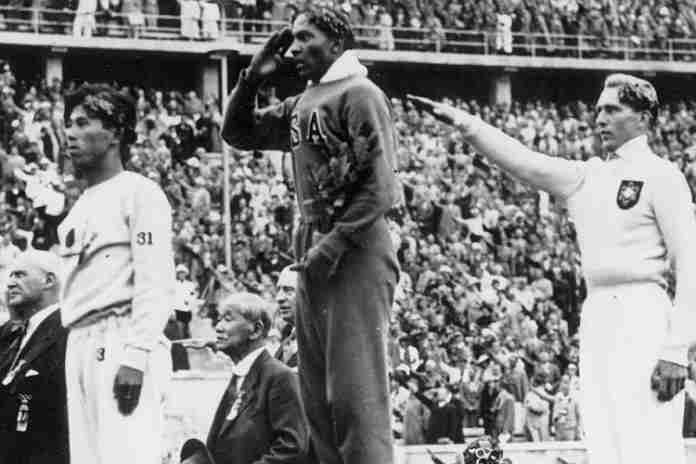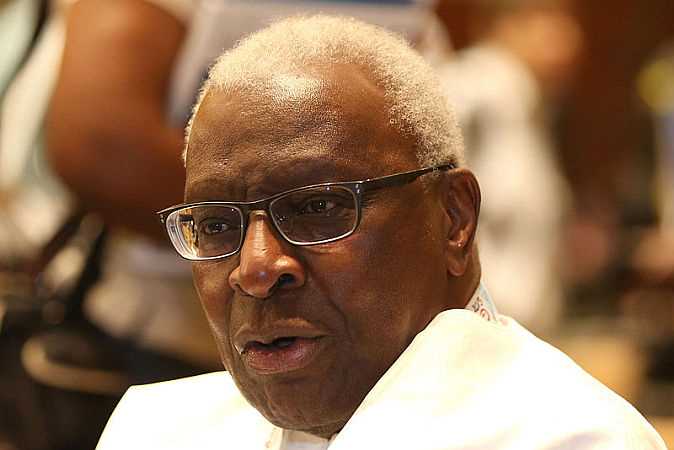News, views and noise from the non-stop, worldwide circus of Olympic sport:
“The claims against me are unfounded”
That’s the reply of former International Weightlifting Federation President Tamas Ajan to allegations in the just-released “Independent Investigator Report to the Oversight and Integrity Commission of International Weightlifting Federation.”
In a statement, Ajan noted:
“In my whole life I have respected the law, the written and unwritten rules and practices of sport.
“In accordance with the IWF Constitution, all necessary decisions were taken by the Executive Board of the International Weightlifting Federation. It was the Executive Board that approved the annual budgets, and the Audit reports submitted by the independent Swiss Auditors – proving the legal handling of the finances – were approved by the Congress.
“The claims against me are unfounded.
“During the investigation I fully cooperated with Mr. McLaren and his team, however, much to my regret and despite my request they never provided me with the information that would have given me the possibility to disprove their statements, and they published the report without giving me the chance of clarification.”
The next steps are up to the IWF and to the Hungarian courts. The International Olympic Committee is expected to take up the question of what to do about weightlifting at its Executive Board meeting on Wednesday (10th).
● Games of the XXXII Olympiad: Tokyo 2020 ● The chatter around the Tokyo Games continues with Toshiaki Endo, a member of the Liberal Democratic Party and also a Tokyo 2020 Board member saying that “Selecting athletes by around next March will be a major challenge. The organizing committee will need to make some kind of a decision considering the situation at that time.”
That’s just about right and a parallel time frame to this year’s decision on 24 March to postpone the Games to 2021. Both the Tokyo organizers and the International Olympic Committee have said that if the Games are not held in 2021, they will not be held at all.
On the planning side, the Kyodo News Agency reported that specific aspects of the Games may be “simplified” in order to reduce costs and raise safety protections:
“The changes could include a reduction in the number of spectators and a scaling back of the opening and closing ceremonies of both the Olympics and Paralympics, according to the sources.
“The provision of medical services, including polymerase chain reaction tests for athletes, staff and spectators, and restrictions on outings from the athletes’ village are also being floated as possible measures against the virus.
“‘We hope to work together with the government and the Tokyo organizing committee to look into what can be rationalized and simplified,’ Tokyo Gov. Yuriko Koike told reporters. ‘It will be necessary in order to gain empathy and understanding from the public.’”
¶
The Association of National Olympic Committees backed up its promise to help financially-troubled NOCs in advance of the postponed Tokyo Games with a fund of $11.65 million.
The announcement noted that the funding will be made “on a case-by-case basis for exceptional needs, or indirectly, via Continental Association’s Tokyo 2020 specific projects (e.g. training camps or athlete preparation programmes.)”
This is a lot of money for ANOC, whose last financial report showed reserves of $36.88 million as of 30 June 2019, but with $10 million expected to be spent in the last half of 2019 and another $11-13 million “earmarked to cover additional expected costs related” to the 2019 General Assembly and the World Beach Games held on Doha.
¶
The Associated Press reported “An ‘open discussion’ is under way with insurance brokers, the IOC’s Olympic Games operations director Pierre Ducrey said Thursday. The aim is ‘to try and find the right level of compensation to help us bear the cost of having to wait another year,’ Ducrey said.”
IOC chief Thomas Bach has said that its policies cover cancellation of a Games, but not specifically a postponement. The IOC paid $14.4 million in premiums against cancellation of the 2016 Rio de Janeiro Games and has paid more against a loss of the 2020 Games, but the question of postponement coverage is a new issue.
● Games of the XXXIII Olympiad: Paris 2024 ● A “shift in approach” due to the coronavirus impact was a main theme in an IOC Coordination Commission online meeting with the Paris 2024 organizers last week.
The IOC posted a statement on the meeting, noting “This new approach is inspired by the recent letter from the IOC President, which was then echoed in the message from Paris 2024 President Tony Estanguet to all Paris 2024 stakeholders, that called for creative and sustainable optimisations in the context of the Olympic and Paralympic Games.”
One important development was announced: “the reduction in the number of beds required in the Olympic and Paralympic Village from just over 17,000 to approximately 14,000. This ensures that the Village is fitted to the needs of the athletes and National Olympic Committees, while controlling the amount of investment required and still leaving an important housing legacy for the Seine-Saint-Denis area of Paris.”
That’s good.
● Athletics ● The “Ultimate Garden Clash – Combined Events” was held on Sunday, with France’s Kevin Mayer – the world-record holder – winning the three-event program with 71 points, ahead of German Niklas Kaul (63) and Estonia’s Maicel Uibo (61).
Mayer competed from Montpellier, France; Kaul from an indoor facility in Mainz (GER) and Uibo was at an outdoor track in Clermont, Florida. The competition started with the pole vault, to see who could clear 4.00 m (13-1 1/2) as many times as possible within 10 minutes, then to the shot to get as many throws as possible over 12.00 m (39-4 1/2), and then a “shuttle run,” with cones at 20 meters apart and the goal to complete as many round trips as possible in five minutes.
Mayer cleared the vault bar 17 times, and won the shot competition with 28 throws beyond the minimum. Kaul won the shuttle run with 27 round trips, with Mayer and Uibo at 26.
The event was shown on YouTube, which showed 35,523 views in about the first 24 hours following the event.
¶
There was a major shock last Friday as Bahrain’s Salwa Eid Naser, the women’s 400 m World Champion from 2019, was provisionally suspended by the Athletics Integrity Unit for missing four doping tests, three of which were prior to the 2019 Worlds in Doha, Qatar.
The AIU released a rare statement on the incident, which included:
“The investigation into Ms. Naser’s three whereabouts failures in 2019 was ongoing at the time of the Doha World Championships and she was not provisionally suspended at that time. Following conclusion of investigation and a fourth whereabouts failure in January 2020, a Notice of Charge was issued and Ms Naser subject to an immediate Provisional Suspension.”
Naser, 22, won the event in a sensational 48.14, the no. 3 performance of all time. In an Instagram video, she said “I’ve never been a cheat. I will never be. I only missed three drug tests, which is normal. It happens. It can happen to anybody. I don’t want people to get confused in all this because I would never cheat.”
As of now, she is suspended and a finding of a doping violation could lead to a suspension of up to four years.
¶
Although the mini-decathlon challenge was fun, the best performance of the weekend may have been American distance runner John Raneri’s world-best of 1:03:08 for the half marathon … on a treadmill!
David Monti of Race Results Weekly reported that Raneri, who has run 61:51 for the Half on the roads, had the machine on its highest speed possible the entire time. “I felt 30 seconds faster was possible if the treadmill was able to go faster. I say that in hindsight.” He broke the 2015 mark of Tyler Andrews (USA) of 1:03:37.
Raneri ran the distance in his coach’s garage in Flagstaff, Arizona (~7,000 ft. altitude), which makes the achievement even that much more remarkable. Wow!
● Gymnastics ● Sad news last Friday of the death of American gymnastics star Kurt Thomas, the first U.S. men’s gymnast to win a World Championships gold medal, He died at 64 from complications from a stroke on 24 May.
Thomas was the 1978 World Championships gold medalist in the Floor Exercise, then won six medals (!) at the 1979 Worlds in Ft. Worth, Texas. He repeated as the Floor Exercise winner, and also won the Horizontal Bar, earned silvers in the All-Around, Parallel Bars and Pommel Horse and a bronze in the Team Competition. Only Simone Biles (in 2018) has won as many medals in a single Worlds as Thomas, among American gymnasts.
A 1976 Olympian at 20, Thomas missed his chance for Olympic glory in 1980 with the U.S. boycott and elected to turn professional and skipped the 1984 Games. He is survived by his wife Beckie and children Hunter, Kassidy and Kurt.
● Skateboarding ● One of the possible stars of the 2020 Olympic Games if held this summer – and may still be next summer – is 11-year-old British skateboarder Sky Brown. But she suffered a fractured skull and broken bones in her left hand from a bad fall during a ride on 2 June.
She was training in an indoor facility in Southern California and veered off a vertical ramp. She was taken to a hospital and released on the following day.
“I don’t usually post my falls or talk about them, because I want people to see the fun in what I do, but this was my worst fall, and I just want everyone to know that I’m OK. I’m just going to get back up and push even harder. I know there’s a lot going on in the world right now and I want everyone to know that whatever we do we’ve got to do it with love and happiness.”
Brown is a true multinational: she competes for Britain, but divides her time between Japan and Southern California. Her father is British, her mother is Japanese, she was born in Miyazaki, Japan and lives in Huntington Beach, California.
● At the BuZZer ● Central Michigan is the latest to drop sports in the wake of the coronavirus pandemic, eliminating men’s track & field as part of school-wide cuts. This lowers the number of men’s sports at CMU to five, which would usually disqualify it from participation as a Division I school, requiring six men’s sports.
But the school received a two-year waiver from the NCAA, allowing it to remain in Division I for now. This continues a growing pattern of sport cuts at NCAA schools due to the economic damage from the pandemic; with possible additional impacts from the passage of new rules allowing widespread athlete income from name-image-likeness programs, a permanent reduction in sports participation requirements looks more and more likely.
Inexorably advancing is the question of at what point do universities – especially those outside of the major conferences – simply drop intercollegiate athletics altogether?



























